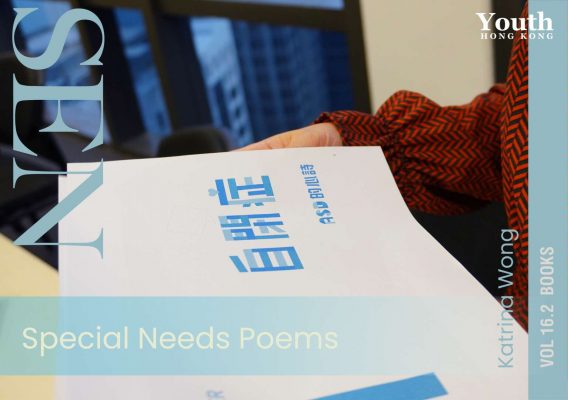//16.2 HKFYG Highlights: Publication
Our New Book:
Special Needs Poems
Outside the window on the left, clouds drift by in the sky
It tickles my heart, making me want to build a rainbow bridge
My body is a caged bird, wings bound by rules
How boring it is to sit still and listen
Wish I could take apart the desks and put them back together
The wooden boards and iron bars can be made into a little rocket ship
Hang up the backpack and it becomes a safety airbag
Fall into the sea and sail with Luffy on an exciting journey
We can also eat some sweet potatoes and produce fuel when we fart
Friends will come to tease
But they don’t understand that even petroleum has a stinky smell!
Use soda bottles to collect it to make it convenient for burning
Thinking about the future, I can’t help but giggle to myself
“You’re not paying attention in class again. The teacher is getting mad!”
– Classroom Fantasy (Excerpt translated from Chinese)
In a classroom filled with rows of desks and standardised expectations, it takes a lot of courage to be different. Young writer, teacher and poet, Katrina Wong gets inspired.
Moved by her personal experiences and keen observations, Katrina has written a collection of poems from the perspective of students with special educational needs (SEN). Her first book, with the tentative title of “Special Needs Poems,” is supported by the Federation’s School Social Work Unit and Professional Publications Unit and will be published and showcased at this year’s Hong Kong Book Fair in July.
Changing Perspectives
Before working with SEN students, Katrina used to teach Chinese literature and Chinese language to secondary school students at a tutorial school. However, she felt that her main purpose was not to help students appreciate literature, but simply help them to achieve higher marks in their examinations.
The turning point came when Katrina encountered a student with Autism Spectrum Disorder (ASD) who struggled to understand the inconsistencies in grading standards and social interactions. Spending a lot of time with the student, and engaging him through patient conversations, she tried to understand his mindset.
These efforts resulted in the student winning a writing competition, who then insisted on putting Katrina’s name on the award certificate as well, much to the objections of the parents, teachers and the school.
Following this experience, Katrina hopes to write about the world from the perspective of her special needs students, which she argues goes beyond normal people’s and teachers’ understanding.
“Sometimes teachers filter what they see from (SEN) students, but what we need to do is to understand their mentality and why they behave like this,” Katrina told Youth Hong Kong, adding that her own experience of thinking and acting differently helps her in the writing process.
We’re All Special
Katrina herself is perhaps more sensitive to diverse ways of thinking. Being told that she might have slight hyperlexia with early acquisition of reading skills by a teacher, it turned out that she couldn’t understand the onomatopoeia taught in Chinese class.
“It just didn’t make sense,” Katrina recalls. “The way dogs bark doesn’t sound like ‘wong wong,’ and yet we were expected to memorise these sounds for exams. Why? I just couldn’t understand.” This disconnect led to misunderstandings. Teachers perceived her as disrespectful and non-compliant.
“Teachers thought I wasn’t respecting them because I refused to do homework without understanding what was going on.” In the end, Katrina found her way to survive in schools. “I figured out that sometimes, it is okay to be average so that nobody will judge you.”
Katrina’s understanding of SEN goes beyond mere acceptance. She believes these “special” traits are not uncommon, but rather a result of human evolution.
“I think everyone has their own SEN,” she argues. “The key lies in recognising your strengths and weaknesses, and then leveraging them to find your place in society.” Katrina cites how some human traits, like heightened observation skills or shorter attention spans, may have been advantageous for survival in earlier times. However, in a structured educational system that emphasises prolonged focus, these same traits can be seen as obstacles.
Katrina sorted out about 40 poems followed by epilogues and submitted them to the Federation’s Young Writers Recruitment Programme. It’s her first try exploring the power of writing and revealing a special universe in the eyes of SEN students.
“My goal is to foster understanding and offer a message of solidarity,” Katrina says. “When you feel like the odd one out, bombarded with instructions on what is the right thing to do, remember you’re not the only one who feels wrong. I hope this book brings comfort and becomes a platform for SEN students to express themselves.” ■
The Federation’s Professional Publications Unit has been dedicated to cultivating young people’s interest in reading and writing. Every year, the unit publishes 10 books to encourage young people to develop their writing skills and express themselves. The Young Writers Recruitment Programme was first introduced in 2016, allowing young people to experience the joy of publishing, share their stories with readers, and realise their dreams of becoming published authors.



